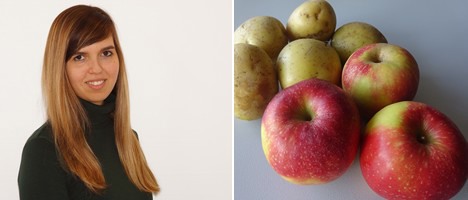Apples have always been the most popular fruit among German consumers. The individual apple varieties differ in their appearance and taste, among other things. lifeprint LLC- a subsidiary of the renowned Tentamus Group - has now developed a new method for identifying 55 of the most popular apple varieties.
Identification of apples using fragment length analysis
The new method is based on PCR (polymerase chain reaction). In this process, specific DNA sections of the respective variety are amplified in vitro. The stalks of the apples are used for DNA extraction, alternatively. If the stalk is missing, the rest of the flower is used. Six stems are tested per variety. "However, the test is also possible with leaf material, if, for example, the tree is to be tested," explains Lisa Hörtrich, who developed most of the procedure.

Lisa Hörtrich from Lifeprint
PCR is used to amplify repetitive sequences of varying length (microsatellites, also known as simple sequence repeats, SSR) in the genome. The length of these PCR products is determined using a bioanalyzer. "Thus, a kind of variety-specific 'fingerprint' is generated, which is then compared with the database to identify the variety. If all six apples show the same pattern, the test report will note "Varietal authenticity confirmed," says Hörtrich.
Variety testing for retailers
It took about two years to develop the innovative method for variety testing. "In the past, we have already developed a testing method for potatoes. We see a similar need on the part of the food retailer for the varietal authenticity of apples. One of the reasons for this is the fact that a lot of goods are marketed loose and the varietal purity on the shelf is therefore more difficult to test."
Whether similar methods will be developed for other fruits and vegetables is still difficult to assess at the moment, Hörtrich confirms. "We want to first check how the demand is in the trade and how the method will be received. We also want to gradually expand our current portfolio of 55 apple varieties."
For more information:
Lifeprint GmbH
Lisa Hörtrich
+49 7303 951 95 32
lisa.hoertrich@lifeprint.de
www.tentamus.de
